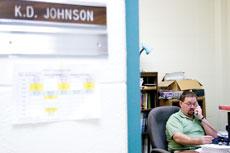Instructor keeps class discipline high

Dr. Jerry Johnson, associate professor of mathematics, said mathematics is something everyone can do as long as they apply themselves to the task.
Rigor and structure were the reoccurring descriptions about a certain math instructor.
“I think my class is rigorous,” said Dr. Kerry Johnson, associate professor of mathematics.
Johnson teaches an array of math courses.
“Dr. Johnson is the best math teacher ever,” said Chrystal Cain, sophomore pre-engineering major. “He is extremely rigorous. We only ended up with four people in our [Calculus I] class due to his rigor.”
Johnson said he enjoys his job and plans to teach into retirement.
“I have always wanted to be a teacher,” he said. “I enjoy teaching. I didn’t like teaching in the high school environment. College is where I need to be.”
“I think he is an excellent professor,” said Jared Wilkinson, senior secondary math education major. “I am thoroughly enjoying the [Calculus III] class. I feel like I have learned quite a bit.”
Johnson said his class is structured to be strict.
“It would be very difficult to do well in my class without doing the work or studying,” Johnson said. “Most college classes are like that.”
Receiving his doctorate from Oklahoma State University, he has researched math placements for college students, reliability studies for satellite batteries and a range of probability and statistical studies.
Aside from mathematics, Johnson’s hobbies include building computers, playing racquetball and reading science fantasy books; however, mathematics is his hobby and occupation.
As a graduate student, Johnson designed the math placement program at Oklahoma State University.
“Math always made sense to me,” Johnson said. “It is interesting.”
He said anyone can obtain a certain degree of understanding of mathematics provided he or she works hard.
“Math phobia is something I don’t understand,” he said. “Somewhere along the way, society found it OK to say I am not good at math. But right now if you went out and said I cannot read, you would be embarrassed. People would look down on you. If you go out and say I cannot do mathematics, suddenly that is an OK thing. I do not think that is an OK thing.”
Johnson said math is pertinent to society.
“This is not the same society it was in 1900,” he said. “In 1900, if you could add some numbers, multiple some numbers and work on a farm the rest of your life, life would probably be OK. That is not where we live now. In the society we live now, people need to know a lot more mathematics.”
He said if someone does not enjoy math, he suggests that person should work at it.
“I had math phobia going into Dr. Johnson class, but he changed it,” Cain said. “I am now centering my major around math because of Dr. Johnson.”
Classroom rigor may be the trend for changing society.
“Being afraid of math is not an acceptable thing,” Johnson said.
“If you keep working at it, eventually you are not going to be afraid of it.”
Johnson said his classes are centered toward learning.
“The attitude – ‘I am not good at it, I have never been good at it’ – doesn’t cut it for me,” he said.
Marshall Rucker, freshman pre-engineering major, disagrees with Johnson’s rigor.
“At first, I was blinded by the Johnson experience,” Rucker said, “but when I got to Dr. Hand’s [Calculus II] class, I knew it was just false rigor.”
He said others were in a similar situation.
“Some couldn’t handle the false rigor,” Rucker said. “They dropped out, but he cannot fool me. I know what false rigor is.”
He said despite the false rigor, Johnson was a great teacher.
Regardless of rigor, mathematics is important to science students, because math is the core for almost of the basic sciences.
“Like in psychology, you are always using statistics in statistical analysis.
The same is true in the real world,” Johnson said. “Mathematics plays a part in everybody’s life. If you drive a car, there was some serious mathematics going into making that machine.”
Although mathematics is a science, seeing the changes in mathematics may be more difficult to the general public.
“Math changes just like every other subject,” Johnson said.
“The general public wouldn’t know it has changed much. There are very few people that would understand something has changed in a field.”
Johnson said most people will not see changes in mathematics.
“Most the stuff people go through doesn’t change,” he said.
“The multiplication tables are still the same.”
Your donation will support the student journalists of Missouri Southern State University. Your contribution will allow us to purchase equipment and cover our annual website hosting costs.















